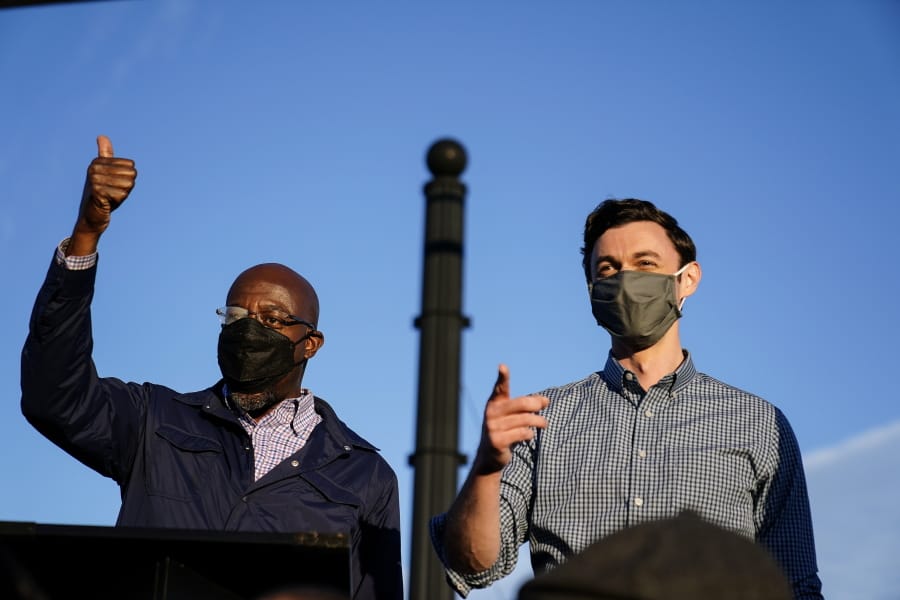WASHINGTON — In Georgia’s twin Senate runoff elections, the duos of GOP incumbent Sens. Kelly Loeffler and David Perdue and Democratic challengers Jon Ossoff and Raphael Warnock are selling themselves to voters as package deals.
But by one key metric, the Democratic candidates have much more in common: their donors.
A McClatchy analysis of campaign finance filings through mid-October shows that Ossoff and Warnock shared more than 5,000 big-money donors in common, compared with fewer than 500 shared by Perdue and Loeffler. And that’s not counting the small-dollar donors whose identities campaigns aren’t legally required to disclose and who have made up significantly larger shares of the Georgia Democrats’ contributions than the Republicans’.
Donors are allowed to give up to $2,800 more to the campaigns ahead of the runoff election, even if they already gave the maximum amount during the primary and general election periods. That means Ossoff and Warnock will likely be counting on these same donors again to help fund races that have already seen hundreds of millions of dollars in spending.
More than 80% of Ossoff’s and Warnock’s common donors who have at least $200 have come from outside Georgia, as the two have tapped into a surge in national fundraising support for Democratic candidates following President Donald Trump’s election in 2016. By contrast roughly 50% of Perdue and Loeffler’s dollars from common donors have come from in-state.
Ossoff and Warnock are part of a wave of Senate candidates who raised eye-popping sums due to the polarizing nature of Trump’s presidency and the growing popularity of the online fundraising platform ActBlue.
“For this cycle, I think so much was dependent on the maturation of ActBlue as a platform,” said Sheila Krumholz, executive director of the nonpartisan Center for Responsive Politics, which tracks campaign finance. “It’s become almost universal among Democrats and Trump has provided the fodder and the fuel to power their appeals.”
A rival fundraising platform to support Republicans, WinRed, grew in popularity during the 2020 election cycle, but isn’t as widely used as ActBlue.
The emergence of those platforms led to a phenomenon some have called “fundraging,” where Democrats contributed money online to candidates across the country, particularly in Senate races, in response to events in the news cycle. Many of Ossoff’s and Warnock’s donors also donated to the campaigns of other Democratic Senate challengers in 2020, such as Jaime Harrison in South Carolina, Amy McGrath in Kentucky and Sara Gideon in Maine.
Overall, Democrats in most key Senate races and many House races outraised their Republican opponents in 2020. But that didn’t necessarily translate into success at the ballot box, as Democrats didn’t flip as many Senate seats as they had hoped and saw their House majority narrow.
But that doesn’t appear to have dimmed the hopes of Democratic donors in Georgia’s Senate races, which will determine which party controls the upper chamber next year.
“I am not discouraged,” said Suzi Dietz, a Los Angeles theater producer who co-hosted a series of fundraisers this year for a host of Democratic candidates and the Republican anti-Trump group the Lincoln Project.
Dietz contributed a total of $10,000 to a committee supporting both Ossoff and the Georgia Democratic Party and $1,260 to Warnock. And she is organizing a joint fundraiser for Ossoff and Warnock next Monday that will feature both candidates talking with former presidential candidate Andrew Yang, who has moved to Georgia to help in the campaign.
Dietz said that 177 people have already signed up for the fundraiser and committed more than $100,000 overall.
“That’s the most money I’ve ever raised for one of these things,” she said.
And Democrats are encouraged by Joe Biden’s narrow win in Georgia in the presidential race, thanks in part to a surge of support from affluent, well-educated voters in and around Atlanta.
Lori Polazzo, a real estate investor in Atlanta, said that before Trump’s election in 2016, she didn’t identify as a Democrat.
“I feel like the pendulum swung so far in the opposite direction that it really made me take a step back and think about what kind of world and country do I want to live in,” Polazzo said.
She and her husband, Chad, hosted a fundraiser at their home before the onset of the pandemic for Ossoff, who attended the same private high school two of their children attend, and have since co-hosted Zoom fundraisers for both Ossoff and Warnock. Polazzo and her husband have given more than $10,000 combined to committees supporting Ossoff and nearly $4,000 to Warnock and she said they had written $1,000 checks to both candidates earlier this week.
“We’re 100% on board,” Polazzo said.
But whether Warnock and Ossoff maintain a fundraising advantage over their opponents might ultimately not make a difference in the outcome of elections that have already seen more than $120 million in spending by candidates, parties and outside groups.
While candidates who outraise their opponents tend to win most of the time, the Center for Responsive Politics’ Krumholz said that past a certain point a fundraising advantage doesn’t necessarily translate to an electoral advantage.
“At some point you hit diminishing returns,” she said. “There comes a point where there’s only so much a candidate can do with the money.”



